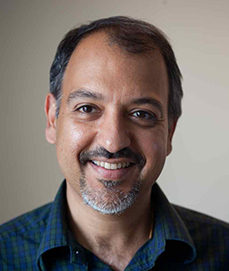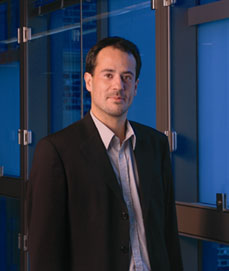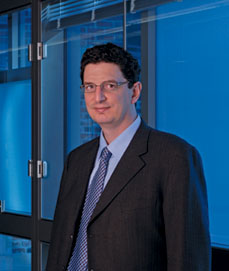Three Engineers Receive 2017 University Awards for Distinguished Teaching
Sanjeev Khanna, Alejandro Ribeiro and George Pappas have each been awarded 2017 University Teaching Awards sponsored by the University of Pennsylvania’s Office of the Provost. The three are amongst 12 awardees throughout the University this year. At an April 25 ceremony, Provost Vincent Price presented the awards and read excerpts of the recommendation letters from faculty and students who nominated the winners.
The Lindback Awards for Distinguished Teaching
The Lindback Awards for Distinguished Teaching at the University of Pennsylvania were established in 1961 with the help of the Christian R. and Mary F. Lindback Foundation. The University of Pennsylvania normally gives out eight Lindback awards each year, divided evenly between health-related disciplines and all other departments and divisions.
 Sanjeev Khanna
Sanjeev Khanna
Henry Salvatori Professor
Computer and Information Science
Sanjeev is the Henry Salvatori Professor in the Department of Computer Science and has taught at Penn since 1999.
Letter writers and course reviewers all agree that Sanjeev’s classes are difficult: “His course on Algorithms—CIS 320—is consistently rated one of the most challenging classes at Penn,” says a colleague. Nevertheless, this ‘Pied Piper’ of the classroom keeps drawing them in with a course described as “brilliant.” A colleague who teaches the same course admits to being “frankly, envious of Sanjeev’s teaching ability.”
A student notes that, “every lecture is first and foremost an adventure. My entire attitude to the challenges of the world has changed.”
Learn more about Dr. Khanna by visiting his faculty profile.
 Alejandro Ribeiro
Alejandro Ribeiro
Rosenbluth Associate Professor
Electrical and Systems Engineering
Alejandro is the Rosenbluth Associate Professor of Electrical and Systems Engineering in the School of Engineering and Applied Science and has taught at Penn since 2008.
A colleague describes this Penn Fellow and Fulbright Scholar as “ambitious, bold, and innovative.” He has redefined Introduction to Stochastic Systems, a junior core course for Systems Engineering students, notes this admirer, adding that “there is absolutely no similar course in the nation at the undergraduate level and Alejandro is writing a textbook based on his teaching.” A current graduate student agrees, noting that “just by attending a single classroom lecture, one will immediately recognize a confident, passionate expert who takes his role as a teacher in the university setting very seriously.”
Numerous students describe a teacher who takes an interest in their interests. One said, “I am a huge soccer fan, as is Professor Ribeiro. When he discovered my interests, he put me in touch with another engineering student working on a project relating to sports analytics and modeling soccer networks. He attempts to learn from and engage with students in a way that is unparalleled.”
Learn more about Dr. Ribeiro by visiting his faculty profile.
Provost’s Award For Distinguished PhD Teaching and Mentoring
The Provost’s Award for Distinguished PhD Teaching and Mentoring has been awarded to two members of Penn’s Standing or Associated Faculty in any school offering the PhD since 2004.
 George Pappas
George Pappas
Joseph Moore Professor and Chair
Electrical and Systems Engineering
George is the Joseph Moore Professor and Chair in the Department of Electrical and Systems Engineering in the School of Engineering and Applied Science and has taught at Penn since 2000.
A colleague notes that more than half of George’s former graduate students are now teaching at top universities; a testament to his “strong commitment and vision for mentoring Ph.D. students.” His mentorship goes far beyond the classroom and includes organizing graduate seminars, workshops for senior Ph.D. students on applying for academic positions, and social gatherings. One former student notes that George “has a certain je ne sais quoi about his mentoring approach. I credit him for bringing out the best in his people. He is your number one fan.”
Another former student adds that “working with George as a post-doc was like a joint effort with a colleague. His door was always open for me, which—looking back now, having now been through the grueling tenure-seeking process—I find amazing.”
Learn more about Dr. Pappas by visiting his faculty profile.
